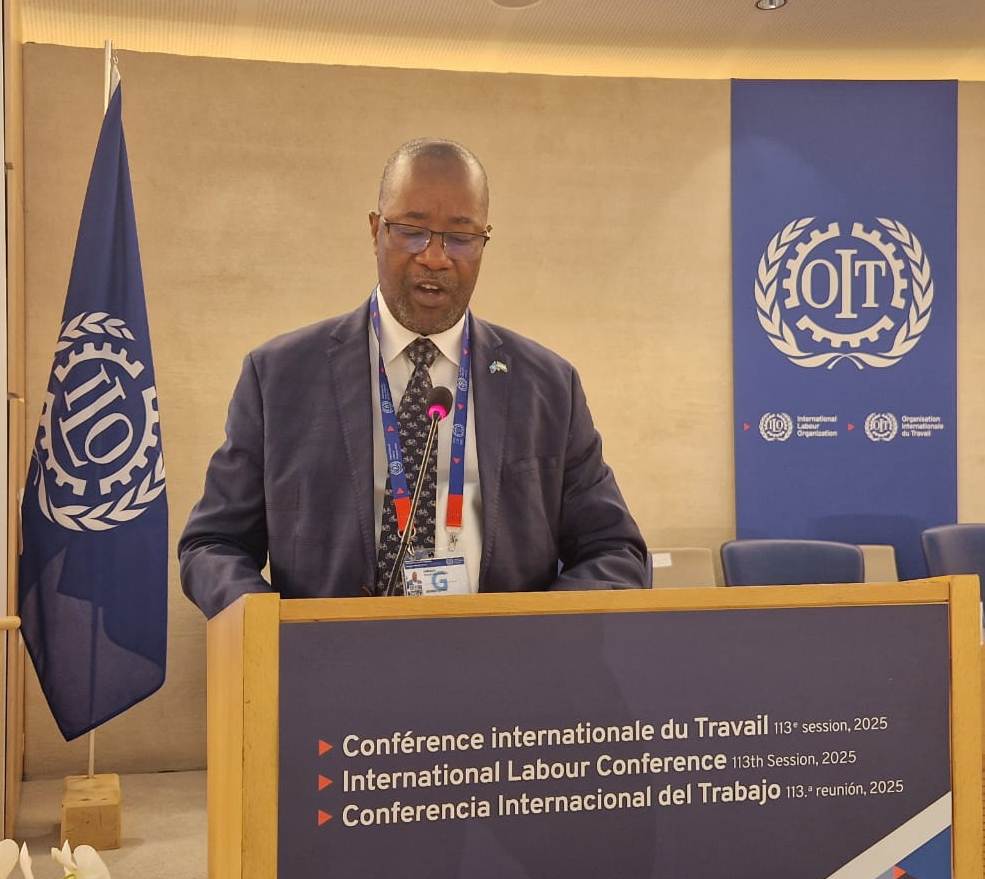The Minister of Employment, Labour, and Social Security, Mohamed Rahman (Rado) Swaray, has called for stronger global partnerships and innovative approaches to tackle informality in labour markets, particularly in developing countries.
He made this passionate appeal while addressing the 113th Session of the International Labour Conference (ILC) in Geneva, Switzerland, on Tuesday this week. Also part of the Sierra Leone delegation to the conference was the President of the Sierra Leone Employers’ Federation, Kobi Walker.
Delivering Sierra Leone’s official statement to the Conference, Mr Swaray emphasized the critical need for global solidarity, technology-driven solutions, and political commitment to address informality—a challenge that affects over 80% of Sierra Leone’s workforce.
“Informality is not just a labour market characteristic in Sierra Leone; it is a reality for the majority of our people,” Minister Swaray told delegates, which included global leaders, labour organizations, employers, and civil society representatives. “From agriculture to small-scale industries, informality is both vibrant and precarious, leaving millions without social protection or access to opportunities available in the formal sector.”
Highlighting recent national progress, the Minister informed the conference about Sierra Leone’s successful hosting of its first-ever National Labour Conference, held just weeks ago. The landmark event brought together a broad coalition of stakeholders—government, workers’ unions, employers, civil society organizations, and international partners—to chart the future of work in Sierra Leone.
At the center of the discussions was the role of innovation and technology in transforming the country’s labour market. This aligns closely with the ILC’s 2025 theme of promoting innovative approaches to addressing informality worldwide.
While recognizing Sierra Leone’s progress, the Minister was candid about the enormity of the challenge, emphasizing that sustainable formalization efforts required more than domestic action.
“Transitioning to formality is not just an economic necessity—it is a moral imperative,” he said, urging the international community to deepen support for developing nations, especially those in the Global South.
He then proposed greater investment in technology, skills development, institutional strengthening, and inclusive partnerships.
“Let us adopt measures to enhance the capacity of countries, especially in the Global South, to develop and implement innovative solutions. Together, we can create a future of work that is just, fair, and inclusive,” he concluded, earning nods of approval from many in attendance.
The International Labour Organization (ILO) has been at the forefront of global efforts to promote decent work and social justice. The 113th ILC session comes at a critical time as economies worldwide are navigating post-pandemic recovery and accelerating efforts toward sustainable development goals (SDGs), particularly SDG 8 on decent work and economic growth.
Sierra Leone’s interventions at the Conference reflect the country’s commitment to aligning national efforts with global labour priorities, especially in driving innovation for inclusive economic transformation.
As deliberations continue this week in Geneva, Sierra Leone’s position is clear: addressing informality is essential not only for economic resilience but for protecting the dignity of work and ensuring that no one is left behind.


